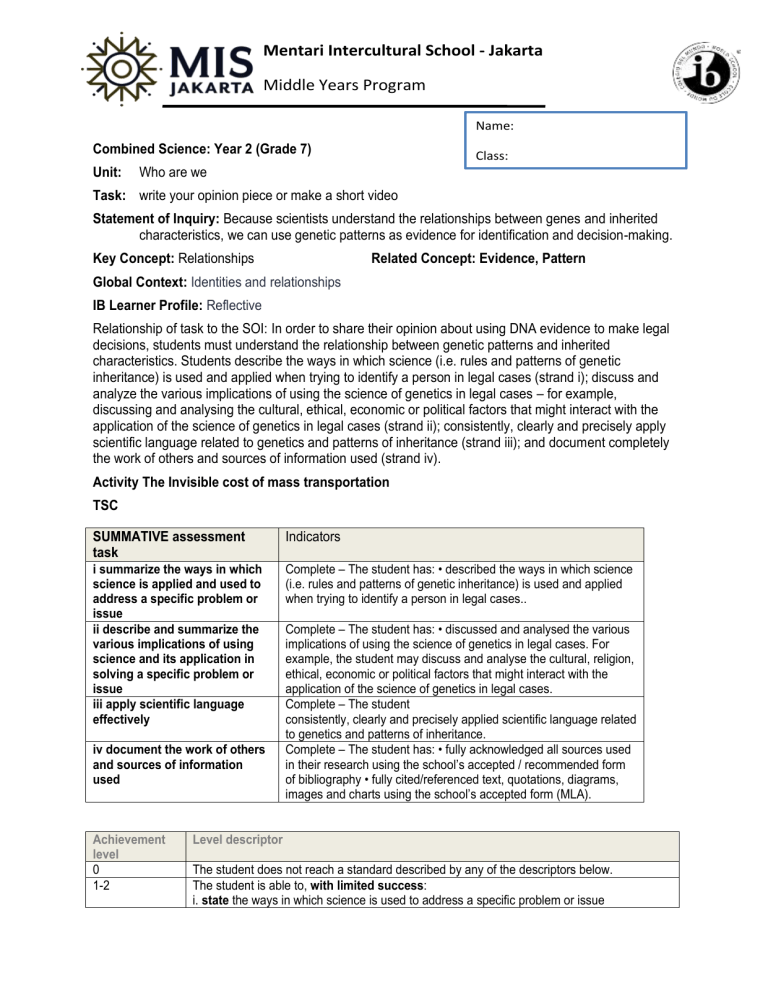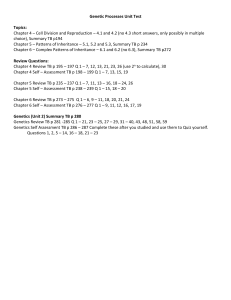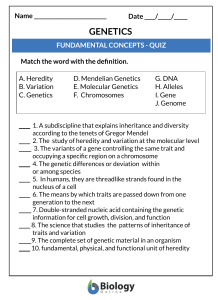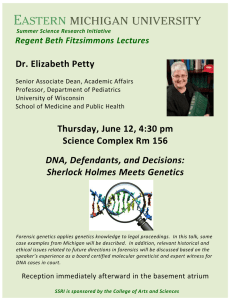
Mentari Intercultural School - Jakarta Middle Years Program Science Department Combined Science: Year 2 (Grade 7) Unit: Name: Class: Who are we Task: write your opinion piece or make a short video Statement of Inquiry: Because scientists understand the relationships between genes and inherited characteristics, we can use genetic patterns as evidence for identification and decision-making. Key Concept: Relationships Related Concept: Evidence, Pattern Global Context: Identities and relationships IB Learner Profile: Reflective Relationship of task to the SOI: In order to share their opinion about using DNA evidence to make legal decisions, students must understand the relationship between genetic patterns and inherited characteristics. Students describe the ways in which science (i.e. rules and patterns of genetic inheritance) is used and applied when trying to identify a person in legal cases (strand i); discuss and analyze the various implications of using the science of genetics in legal cases – for example, discussing and analysing the cultural, ethical, economic or political factors that might interact with the application of the science of genetics in legal cases (strand ii); consistently, clearly and precisely apply scientific language related to genetics and patterns of inheritance (strand iii); and document completely the work of others and sources of information used (strand iv). Activity The Invisible cost of mass transportation TSC SUMMATIVE assessment task Indicators i summarize the ways in which science is applied and used to address a specific problem or issue ii describe and summarize the various implications of using science and its application in solving a specific problem or issue iii apply scientific language effectively Complete – The student has: • described the ways in which science (i.e. rules and patterns of genetic inheritance) is used and applied when trying to identify a person in legal cases.. iv document the work of others and sources of information used Achievement level 0 1-2 Complete – The student has: • discussed and analysed the various implications of using the science of genetics in legal cases. For example, the student may discuss and analyse the cultural, religion, ethical, economic or political factors that might interact with the application of the science of genetics in legal cases. Complete – The student consistently, clearly and precisely applied scientific language related to genetics and patterns of inheritance. Complete – The student has: • fully acknowledged all sources used in their research using the school’s accepted / recommended form of bibliography • fully cited/referenced text, quotations, diagrams, images and charts using the school’s accepted form (MLA). Level descriptor The student does not reach a standard described by any of the descriptors below. The student is able to, with limited success: i. state the ways in which science is used to address a specific problem or issue ii. state the implications of using science to solve a specific problem or issue, interacting with a factor iii. apply scientific language to communicate understanding iv. document sources. The student is able to: i. state the ways in which science is used to address a specific problem or issue ii. state the implications of using science to solve a specific problem or issue, interacting with a factor iii. sometimes apply scientific language to communicate understanding iv. sometimes document sources correctly. The student is able to: i. outline the ways in which science is used to address a specific problem or issue ii. outline the implications of using science to solve a specific problem or issue, interacting with a factor iii. usually apply scientific language to communicate understanding clearly and precisely iv. usually document sources correctly The student is able to: i. summarize the ways in which science is applied and used to address a specific problem or issue ii. describe and summarize the implications of using science and its application to solve a specific problem or issue, interacting with a factor iii. consistently apply scientific language to communicate understanding clearly and precisely iv. document sources completely 3-4 5-6 7-8 Activity: Tracking your traits ATL Reflection skills: Consider ethical, cultural and environmental implications Imagine you are a journalist for newspaper, news show or news channel. Once every week, one of the journalists in your organization writes an opinion based article related to current event. Recently, a court case has begun in which DNA evidence is going to be used against the suspect. Because you have been reporting on the trial, your boss has asked you to write the opinion piece in response to the debatable question: “to what extent should legal cases depend on identifying people through DNA?” Even though it is an opinion piece, you must support your opinion with scientific evidence and reasoning. Therefore, you must be sure to: 1. Describe how science is used and applied when trying to identify a person in legal cases 2. Discuss and analyse the various implication of using science in legal cases – the implications should be related to cultural, ethical, religion, economic or political factors 3. Apply scientific language effectively 4. Document the work of others and sources of information used. Due date Wednesday March 3 You may either write your opinion piece or make a short video. (max 7min) Remember to use scientific language you have learned clearly and correctly. Document all sources, using the referencing and citation standard recommended by your English teacher.


